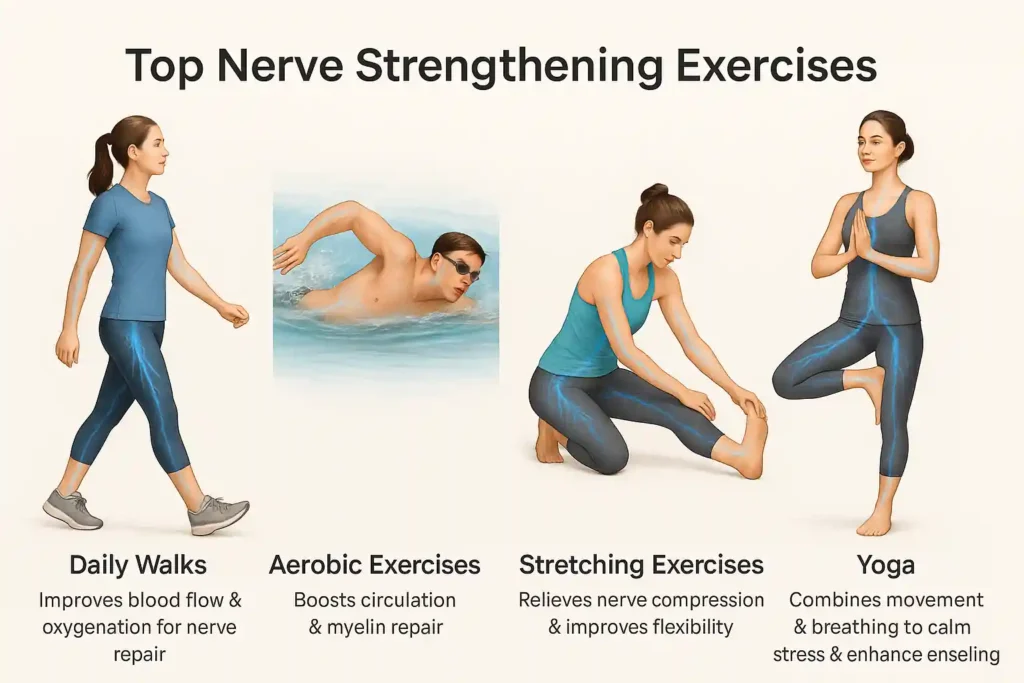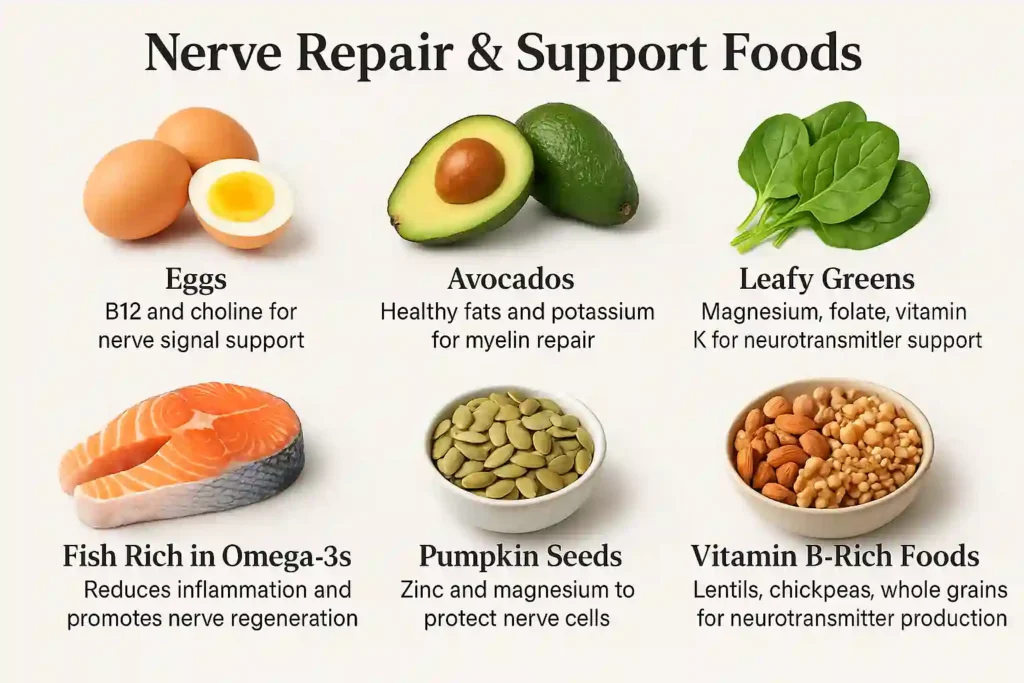Table of Contents
ToggleImportance of Nervous System Health
The health of the nervous system is fundamental to the overall functioning of your body. Every movement, memory, reflex, or sensation depends on how strong and responsive your nerves are. Weak nerves lead to tingling in your hands, frequent fatigue, reduced balance, and even slower thinking.
Most people focus on heart or muscle health, but forget the network of nerves that allow the body to communicate with itself. Think of nerves as power lines; when they are weak, the signal becomes unclear, leading to confusion in the body.
Your nervous system consists of two main divisions: the central system, which includes the brain and spinal cord, and the peripheral system, which extends into your limbs and organs.
Conditions like peripheral neuropathy show how easily these systems can get damaged. Tingling, burning pain, and numbness are signs your nerves need attention.
The good news is nerves respond well to care. With the right mix of exercise, nerve repair foods, and proper rest, they can heal and even regenerate. This makes it possible to prevent long-term nerve weakness and improve quality of life.
Top Nerve Strengthening Exercises

Daily Walks for Nervous System Health
Walking looks simple but it is one of the most powerful ways to improve nervous system health. Regular walking improves blood flow, which provides oxygen and nutrients that help repair damaged nerves. This oxygenation supports faster nerve damage recovery and reduces the risk of nerve-related diseases.
For example, people with diabetic nerve issues who include 30-minute daily walks often report less tingling and better foot strength. A brisk walk in the morning or after dinner also lowers stress hormones that interfere with nerve signals.
Aerobic Exercises for Better Circulation and Nerve Repair
Aerobic exercises like swimming, cycling, or jogging activate large muscles, which in turn increases circulation. When circulation improves, more nutrients reach the nerves, allowing repair at the cellular level.
Studies show aerobic exercise helps in repairing myelin, the protective covering of nerves. This is important because without a healthy myelin sheath, signals get blocked or delayed. For people struggling with coordination, aerobic activity improves nerve function improvement by making signals faster.
If running feels hard, swimming is an excellent choice. The water supports the body and reduces pressure on painful nerves while still promoting strength and oxygen supply.
Stretching Exercises for Flexibility and Nerve Support
Nerve compression frequently leads to pain and weakness. Stretching for nerves reduces this compression by loosening tight muscles. Daily stretching also helps with flexibility, which prevents injuries that often worsen nerve issues.
Simple examples include hamstring stretches that reduce pressure on the sciatic nerve, or gentle neck rolls to ease tension in nerves around the shoulders. Even office workers benefit by standing up every hour and stretching arms and legs to avoid stiffness that blocks nerve signals.
Yoga for Nerve Health
Yoga for nerve strength is a combination of movement, breathing, and mindfulness. This makes it more than physical exercise; it is also a stress reliever. Stress hormones interfere with nerve communication, so lowering stress improves overall nervous system support.
Yoga poses like Bridge Pose improve spinal strength, Child’s Pose relaxes nerves in the lower back, and Tree Pose enhances balance. Breathing exercises during yoga increase oxygen flow to the brain, improving the brain and nerve connection. People who practice yoga regularly often report better memory, sharper focus, and relief from nerve-related pain.
Top Foods to Strengthen Nerves

Eggs as the Best Food for Nerves Repair
Eggs are a powerhouse of choline and vitamin B12, which support neurotransmitter production. Without these nutrients, nerve signals slow down and fatigue appears. This is why eggs are often called the best food for nerve repair.
One example is people with B12 deficiency who suffer from numbness in their feet; after regular intake of eggs and other B12-rich foods, they notice significant improvements in sensation and energy levels.
Avocados for Healthy Fats and Nervous System Support
Avocados are a source of monounsaturated fats that aid in the repair of myelin, the protective sheath surrounding nerves. A healthy myelin sheath ensures signals pass quickly and clearly, which is critical for good reflexes and memory.
The creamy fruit also provides potassium, which balances nerve impulses. For those needing nerve pain relief, avocados reduce inflammation that often triggers nerve irritation. Including half an avocado in salads or smoothies daily supports long-term nervous system support.
Green Leafy Vegetables as Nerve Repair Foods
Leafy greens such as spinach, kale, and broccoli are excellent foods for nerve repair. They contain folate, vitamin K, and magnesium, which help generate neurotransmitters. Magnesium especially calms overactive nerves and prevents spasms.
A diet high in leafy greens reduces the risk of neurodegenerative diseases. For example, older adults who ate spinach five times a week performed better on memory tests compared to those who did not.
Fish Rich in Omega-3s for Nerve Health and Supplements for Nerve Damage
Omega-3 fatty acids in salmon, sardines, and mackerel repair nerve tissue by reducing inflammation. They also promote the regeneration of nerve fibers. For people who cannot eat fish regularly, omega-3 supplements for nerve damage are useful.
These fatty acids improve learning speed and memory. Parents often notice children who eat fish regularly perform better in tasks that require concentration and quick reflexes.
Pumpkin Seeds as Natural Remedies for Nerve Health
Pumpkin seeds are loaded with zinc, magnesium, and antioxidants. They act as natural remedies for nerve health by reducing oxidative stress that damages nerve cells.
For instance, zinc is essential for repairing DNA in nerve cells, while magnesium calms excitability. Snacking on roasted pumpkin seeds can be a simple way to provide continuous protection against nerve damage.
Nuts Packed with Antioxidants and Nerve Repair Benefits
Nuts, including almonds, walnuts, and cashews, are excellent sources of vitamin E. This vitamin protects nerves from free radicals that age cells faster. The healthy fats present in nuts also enhance brain activity.
Walnuts especially are known for supporting memory, making them one of the most beneficial nerve repair foods. Regular intake of nuts ensures long-term nerve repair benefits while reducing risks of degenerative diseases.
Foods Rich in Vitamin B for Nervous System Health
Vitamin B complex foods like lentils, chickpeas, and whole grains are crucial for neurotransmitter production. Without them, nerve signals become weak, leading to fatigue and poor reflexes.
Including vitamin B-rich foods daily boosts nervous system health and prevents numbness or tingling. For those with chronic stress, these foods improve resilience by supporting adrenal glands, which are directly linked to nerve performance.
Precautions While Strengthening Nerves
Start Slowly to Avoid Strain on the Nervous System
Rushing into hard workouts often harms rather than helps. Nerves need gradual stimulation. Beginning with light walking and progressing slowly reduces the risk of overloading sensitive nerve endings.
Avoid Strain While Doing Nerve Strengthening Exercises
Always listen to your body. Shooting pain, dizziness, or tingling are signals to stop. Overexertion delays recovery. Controlled movements help build strength without putting excess pressure on weak nerves.
Seek Professional Guidance Before Using Supplements for Nerve Health
There are many supplements for nerve health including omega-3s, alpha-lipoic acid, and B vitamins. But each body reacts differently. Consulting a professional ensures the correct choice, avoiding risks from wrong dosages or interactions.
Use Recovery Aids as Natural Remedies for Nerve Health
Massage, meditation, and good sleep are reliable natural remedies for nerve health. Warm compresses increase circulation, while meditation lowers stress. Together, they create an environment where nerves can repair faster and more effectively.
The Science Behind Exercise and Nerve Health
Exercise triggers growth factors that stimulate regeneration of nerve cells. It also strengthens mitochondria, the energy producers in cells. When mitochondria are healthy, nerves communicate better and resist damage.
Improved circulation from exercise brings nutrients and oxygen that repair tissues. This leads to faster nerve damage recovery and improved reflexes. Exercise also reduces cortisol, a stress hormone that blocks effective communication between the brain and nerves.
A good example is stroke rehabilitation programs. Patients regain faster function when exercise is included because it forces the brain to form new nerve pathways, showing how adaptable nerves are when stimulated correctly.
The Bottom Line
Nerves are like hidden wires running every function in your body. Protecting them with the right habits keeps you sharp, strong, and balanced. Daily walking, aerobic activities, stretching for nerves, and yoga for nerve strength provide physical repair. Pairing these with eggs, fish, nuts, and leafy greens ensures your body gets the nutrients it needs for long-term strength.
By focusing on nervous system health, you are not only protecting your reflexes and memory but also preventing conditions like neuropathy. Think of every healthy habit as an investment in your body’s communication system. Small daily changes can make a lifetime of difference.
FAQs
Which food is best for nerve strength?
Eggs are the best food for nerve repair since they are packed with B12 and choline. These nutrients improve nerve signals, support memory, and prevent weakness in hands and feet.
What exercises strengthen the nerves?
Walking, swimming, stretching for nerves, and yoga for nerve strength build endurance, improve circulation, and help with faster nerve healing. They are simple yet effective exercises for all age groups.
How can you strengthen your nervous system?
Regular exercise, daily intake of nerve repair foods, stress reduction, and good sleep improve nervous system health. Combining physical activity with nutrition gives your body the best chance at recovery.
What can repair nerve damage?
Nerve damage may heal through proper nutrition, exercise, and sometimes supplements for nerve damage. Foods rich in B vitamins, omega-3s, and antioxidants work together to repair damaged tissues.
Can exercise regenerate nerves?
Yes, exercise stimulates growth factors that help regenerate nerve cells. Aerobic activity and stretching improve circulation, allowing oxygen and nutrients to reach damaged tissues for faster nerve damage recovery.
What juice is good for nerve repair?
Carrot, beetroot, and spinach juices are effective for vitamins for nerve repair. They reduce oxidative stress, improve circulation, and deliver essential nutrients that protect nerves from long-term weakness.
What are the symptoms of a weak nervous system?
Weak nerves show symptoms such as tingling, numbness, fatigue, poor reflexes, and memory lapses. Early signs include imbalance, frequent falls, and sensitivity to temperature changes in the body.
About The Author

This article is medically reviewed by Dr. Chandril Chugh, Board-Certified Neurologist, providing expert insights and reliable health information.
Dr. Chandril Chugh is a U.S.-trained neurologist with over a decade of experience. Known for his compassionate care, he specializes in treating neurological conditions such as migraines, epilepsy, and Parkinson’s disease. Dr. Chugh is highly regarded for his patient-centered approach and dedication to providing personalized care.
→ Book a consultation to discover which remedies suit your needs best.






